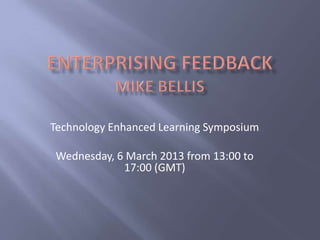
Enterprising feedback
- 1. Technology Enhanced Learning Symposium Wednesday, 6 March 2013 from 13:00 to 17:00 (GMT)
- 2. Effective feedback Technology enhanced learning Individual student learning needs Entrepreneurship / Enterprise
- 3. Use of audio files Assignment brief Tutorials PGCEL Review of equipment
- 4. Funding received from Leadership Foundation for Higher Education through CfEL 3 Focus groups from one pre-registration nursing cohort All received digitally annotated scripts, plus either… A typed front feedback sheet An audio file with feedback (grade included) An audio file without grade (released after they had reflected on feedback)
- 5. Format of feedback Digital annotation Feedback content Reflective response Enterprise / entrepreneurial skills
- 6. Those who did not receive audio file would have preferred to have received one! Two groups receiving audio: More personal and ‘polished’ More in-depth and ‘richer’ Clearer and given ‘more attention’ Listened to audio file more than they would normally read written feedback
- 7. More likely to take note of audio than written Made notes around audio file Future – only one preferred written
- 8. Better than hand written - clearer Link between audio-file and digital comments useful. Less obvious with typed sheet and annotation group Less personal than hand written, but this depends on whether hand written is decipherable
- 9. Content biggest impact on progression and development, rather than format Positive comments appreciated, especially elaboration on ‘good point’ or ‘’ Audio-files allow for greater expansion on feedback, that is difficult to cover in written Audio-files enhance the nature of the feedback
- 10. ‘I did ok but could have done better, now give me the grade!’ If the whole group had to do this, and all grades released at the same time, they would be ok with this Having to make a response, created more consideration of comments Quick release of grade after comments received was appreciated Anxiety provoking wait outweighs benefit of reflection
- 11. Self awareness Feedback in all groups made them more aware of their learning needs Audio groups – this was more ‘evident’ due to being more personalised – interacted more, especially delayed grade group
- 12. Collaborative working Typed = clearer comments, which they discussed more with peers Audio (including grade) did not discuss with peers as much, due to audio being comprehensive Audio (delayed grade) discussed more with their peers
- 13. Practical Creativity Realised the importance of need for logical and cohesive flow to work from feedback Identified need to read more literature and compare and contrast (different ways of doing this) Time management identified as an issue Audio group (delayed grade) noted the above more than others, and they needed to work harder next time The ‘practical’ way of preparing to submit more evident than ‘creativity’ in participants’ eyes
- 14. Opportunity Awareness Additional prompts identified need to seek further help with work (e.g. student support, literature searching, accessing library, critical analysis). Audio groups felt format allowed for greater expansion on these points Audio group (delayed grade) took opportunity to discuss feedback with peers more then before, but did not see this as ‘collaborative working’ Audio format makes it more personalised, and therefore more likely to act on opportunities available
- 15. Strategic Thinking Identified need to plan more, as opposed to ‘Strategic thinking’ Action Orientation Many students had already acted upon the feedback Audio (delayed grade) seemed to be more active in addressing feedback than other groups
- 16. It can take longer…but…. Recording average of audio-file took 4 minutes, whereas typing sheet took 8! Not for everyone Be careful where you record and where it is played! Make notes More tech = more in-depth? (marker perspective) Content is more important than format
- 17. Students consistently evaluate audio files positively in module evaluations and Staff Student Consultative Committees Students have choice of audio or written feedback at the point of submission, in addition to digital annotation in one module. Assignment brief audio- file available in most
Notas do Editor
- Based upon assignment brief experience and comments from each other